| Srl | Item |
| 1 |
ID:
121720
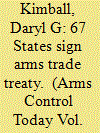

|
|
|
|
|
| Publication |
2013.
|
| Summary/Abstract |
Senior diplomats from 67 European, Latin American, Asian, and African states signed the Arms Trade Treaty (ATT) at the United Nations on June 3.
|
|
|
|
|
|
|
|
|
|
|
|
|
|
|
|
| 2 |
ID:
130331
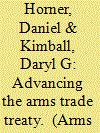

|
|
|
|
|
| Publication |
2014.
|
| Summary/Abstract |
Thomas Countryman took office as assistant secretary of state for international security and nonproliferation on September 27, 2011. He joined the U.S. Foreign Service in 1982. He was lead negotiator for the United States in the talks that produced the Arms Trade Treaty (ATT) last year. Arms Control Today spoke with Countryman in his office on March 12. Countryman was joined by William Malzahn, senior coordinator in the Office of Conventional Arms Threat Reduction. In the interview, Countryman explained the reasons that the United States signed the ATT, addressed domestic criticism of the pact, and looked ahead to the challenges that the treaty faces.
|
|
|
|
|
|
|
|
|
|
|
|
|
|
|
|
| 3 |
ID:
162100
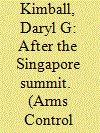

|
|
|
| 4 |
ID:
130322
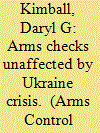

|
|
|
|
|
| Publication |
2014.
|
| Summary/Abstract |
Although the widening confrontation over the political future of the Crimean peninsula and other parts of the former Soviet Union has ruptured already-strained relations between Moscow and the West and put at risk the implementation of some nuclear risk-reduction initiatives and agreements, Russia is not planning to stop allowing the on-site inspections required under the 2010 New Strategic Arms Reduction Treaty (New START), Russian officials said last month. To protest Russia's actions to take control of Crimea, the seven non-Russian members of the Group of Eight (G-8) industrialized countries have suspended Russia's membership in the group. As part of that decision, the seven countries-Canada, Italy, France, Germany, Japan, the United Kingdom, and the United States-changed the location of their planned June summit from Sochi to Brussels. The Russian actions in Crimea have disrupted planning for the activities of the Global Partnership against the Spread of Weapons and Materials of Mass Destruction, which the G-8 launched in 2002.
|
|
|
|
|
|
|
|
|
|
|
|
|
|
|
|
| 5 |
ID:
130356
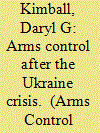

|
|
|
|
|
| Publication |
2014.
|
| Summary/Abstract |
The Global Nuclear Disarmament and risk reduction enterprise is at a crossroads as U.S.-Russian relations have reached perhaps their lowest point in more than a quarter century. Nevertheless, it remains in U.S. and Russian interests to implement existing nuclear risk reduction agreements and pursue practical, low-risk steps to lower tensions. Present circumstances demand new approaches to resolve stubborn challenges to deeper nuclear cuts and the establishment of a new framework to address Euro-Atlantic security issues.
Even before the recent political turmoil in Ukraine and Russian President Vladimir Putin's extralegal occupation and annexation of Crimea, relations between Moscow and Washington were chilly. Despite U.S. adjustments to its missile defense plans in Europe that eliminate any threat to Russian strategic missiles, Putin rebuffed U.S. President Barack Obama's proposal last June to reduce U.S. and Russian strategic stockpiles by one-third below the ceilings set by the New Strategic Arms Reduction Treaty (New START).
Moving forward will be difficult, but doing nothing is not an option. Through earlier crises during and after the Cold War, U.S. and Russian leaders pursued effective arms control and disarmament initiatives that increased mutual security and significantly reduced the nuclear danger. Much has been achieved, albeit too slowly, but there is far more to be done.
As the world's non-nuclear-weapon states persuasively argue, U.S. and Russian stockpiles still far exceed any plausible deterrence requirements, and the use of just a few nuclear weapons by any country would have catastrophic global consequences. As the 2015 Nuclear Nonproliferation Treaty (NPT) Review Conference approaches, pressure to accelerate action on disarmament will only grow.
For now, neither Russia nor the United States wants to scrap the existing arms control regime, including New START and the Intermediate-Range Nuclear Forces (INF) Treaty, which provide greater predictability and stability in an otherwise strained bilateral relationship. A return to a period of unconstrained strategic nuclear competition would not only deepen the distrust and increase dangers for both sides, but also would undermine the NPT. Scrapping the existing nuclear risk reduction measures would do nothing to protect Ukraine from further Russian aggression or reassure nervous NATO allies.
Unfortunately, the profound tensions over Ukraine delay the possibility of any formal, bilateral talks on nuclear arms reductions and missile defense. In light of these realities, Obama and other key leaders must explore alternative options to reduce global nuclear dangers and defuse U.S.-Russian strategic tensions.
|
|
|
|
|
|
|
|
|
|
|
|
|
|
|
|
| 6 |
ID:
180427


|
|
|
|
|
| Summary/Abstract |
After more than a decade of rising tensions and growing nuclear competition between the two major nuclear-weapon states, U.S. President Joe Biden has signaled he will confront Russia when necessary. But, he also stressed, “where it is in the interest of the United States to work with Russia, we should, and we will”—specifically on reducing the risk of nuclear conflict.
|
|
|
|
|
|
|
|
|
|
|
|
|
|
|
|
| 7 |
ID:
173019


|
|
|
|
|
| Summary/Abstract |
Three and a half years since taking office, the Trump administration has failed to develop, let alone pursue, a coherent nuclear arms control strategy. The administration’s official nuclear policy document, the “2018 Nuclear Posture Review,” barely discusses arms control as a risk reduction tool. It passively states that “the United States will remain receptive to future arms control negotiations if conditions permit.”
|
|
|
|
|
|
|
|
|
|
|
|
|
|
|
|
| 8 |
ID:
115592
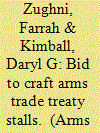

|
|
|
| 9 |
ID:
189683
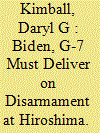

|
|
|
|
|
| Summary/Abstract |
In the midst of Russian nuclear threats in its war on Ukraine and an accelerating global nuclear arms competition, U.S. President Joe Biden and other leaders of the Group of Seven (G-7) industrialized states will convene for their 2023 summit in Hiroshima, Japan.
|
|
|
|
|
|
|
|
|
|
|
|
|
|
|
|
| 10 |
ID:
176620
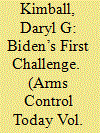

|
|
|
|
|
| Summary/Abstract |
Until the Trump era, every U.S. president since John Kennedy has successfully concluded at least one agreement with the Soviet Union, or later Russia, to reduce the dangers posed by nuclear weapons to the United States and the world.
|
|
|
|
|
|
|
|
|
|
|
|
|
|
|
|
| 11 |
ID:
182272
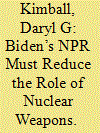

|
|
|
|
|
| Summary/Abstract |
Most successful U.S. presidents have actively led efforts to advance arms control agreements and reduce the risk of nuclear war. Although much has been achieved over the years, there are still 14,000 nuclear weapons and nine nuclear-armed states; progress on disarmament has stalled; and tensions between the United States and its main nuclear adversaries—Russia and China—are rising.
|
|
|
|
|
|
|
|
|
|
|
|
|
|
|
|
| 12 |
ID:
141683
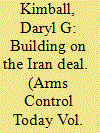

|
|
|
|
|
| Summary/Abstract |
The agreement, known as the Joint Comprehensive Plan of Action, will severely curtail Iran’s nuclear capabilities for at least 15 years and put in place a multilayered verification and monitoring regime. By blocking Iran’s pathways to a nuclear bomb, the agreement also helps head off nuclear competition in the unstable Middle East.
|
|
|
|
|
|
|
|
|
|
|
|
|
|
|
|
| 13 |
ID:
162105
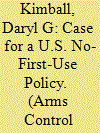

|
|
|
| 14 |
ID:
115791
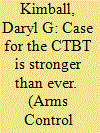

|
|
|
| 15 |
ID:
152188
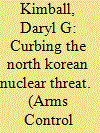

|
|
|
| 16 |
ID:
155573
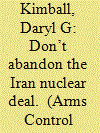

|
|
|
|
|
| Summary/Abstract |
Although his administration is already struggling with one major nonproliferation challenge—North Korea’s advancing nuclear and missile capabilities—President Donald Trump soon may initiate steps that could unravel the highly successful 2015 Iran nuclear deal, thereby creating a second major nonproliferation crisis.
|
|
|
|
|
|
|
|
|
|
|
|
|
|
|
|
| 17 |
ID:
190338
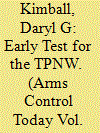

|
|
|
|
|
| Summary/Abstract |
The 2017 Treaty on the Prohibition of Nuclear Weapons (TPNW) has changed the global debate on the advisability, legality, and morality of the continued possession and modernization of nuclear weapons for the better. Since the treaty entered into force in 2021, states-parties have reinforced the taboos against nuclear use and threats of use, particularly in connection with Russian threats of nuclear weapons use in its war on Ukraine.
|
|
|
|
|
|
|
|
|
|
|
|
|
|
|
|
| 18 |
ID:
111974
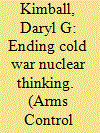

|
|
|
| 19 |
ID:
107347
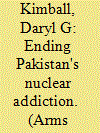

|
|
|
| 20 |
ID:
152065
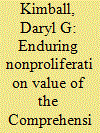

|
|
|
|
|
| Summary/Abstract |
Twenty years after the opening for signature of the CTBT, the treaty has near universal support and has established a global norm against nuclear-test explosions. The nuclear-testing taboo impedes the development of new and more advanced nuclear-warhead designs, which helps prevent dangerous nuclear competition and maintain international security. The treaty's international test-monitoring regime is nearly complete and already detects and deters clandestine nuclear explosions, even ahead of entry into force of the treaty. The UN Security Council's adoption in September 2016 of a resolution on the test ban has reinforced the norm against testing and reaffirmed global support for the treaty. But in order to realize the full potential of the treaty and close the door on testing, states need to undertake new and sustained diplomatic efforts that underscore the political and security value of the treaty for each of the hold-out states.
|
|
|
|
|
|
|
|
|
|
|
|
|
|
|
|